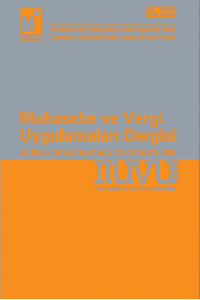Abstract
Milattan sonra sekizinci
yüzyılda kurulan ve yerleşik hayata geçiş yapan ilk Türk devleti olarak bilinen
Uygur Devleti, İslamiyet öncesi kurulan Türk devletleri içinde ticarete en çok yönelen
devlet olma özelliğine sahiptir. Bu durum
ise Uygurların gelişmiş bir mali düzen ve muhasebe bilgisine sahip olduğunun
göstergesi olarak kabul edilmektedir. Uygur belgeleri incelendiğinde
günümüzdeki muhasebe kavramının “sagış” olarak adlandırıldığı görülmektedir. Bu
nedenle “Tarihi Belgeler Işığında Uygurlarda Sagış” olarak başlıklandırılan bu
çalışmada, Uygur dönemi hukuki ve ticari
vesikaları ışığında Uygurların muhasebe düzeni hakkında bilgi verilmesi
amaçlanmaktadır. Bu amaç doğrultusunda çalışmada öncelikle Uygur dönemi ticari
ve mali düzeni hakkında bilgi verilecek, daha sonra bazı hukuki ve ticari
belgeler çerçevesinde dönemin muhasebe düzeni ve işleyişi açıklanmaya
çalışılacaktır.
References
- 4. ICAFR 17
Abstract
The Uyghur
State, established in the eightth century AD and known as the first Turkish
state to adopt a settled life, is the state most interested in trade within the
pre-Islamic Turkish states. This is considered to be a sign that the Uyghurs
have an advanced fiscal system and accounting knowledge. When the Uyghur
documents are examined, it is seen that today's accounting concept is called “sagış”. This study, entitled "Sagis In
Uyghurs In The Light Of Historıcal Documents", aims to give information
about Uyghurs’ accounting system in light of Uyghur legal and commercial
documents. For this purpose, first of all, information about the commercial and
financial structure of the Uyghur period will be given and then the accounting system
and functioning will be tried to be explained in the frame of some legal and
commercial documents.
References
- 4. ICAFR 17
Details
| Primary Language | Turkish |
|---|---|
| Journal Section | Issue |
| Authors | |
| Publication Date | April 20, 2018 |
| Submission Date | October 6, 2017 |
| Acceptance Date | April 1, 2018 |
| Published in Issue | Year 2018 Special Issue of the 10th Year |
Cited By
MALİYE KAMU MALİYESİ İLİŞKİSİ VE KAMUNUN ÖNEMİ: KAVRAMSAL TEMELLİ BİR DEĞERLENDİRME
Dokuz Eylül Üniversitesi Sosyal Bilimler Enstitüsü Dergisi
Esra DOĞAN
https://doi.org/10.16953/deusosbil.554953
TÜRKİYE MUHASEBE TARİHİ İLE İRAN MUHASEBE TARİHİNİN KARŞILAŞTIRILMASI
Akademik Yaklaşımlar Dergisi
https://doi.org/10.54688/ayd.1110319
İSLAMİYET ÖNCESİ TÜRK DEVLETLERİNDE KAMUSAL HİZMETLER VE BU HİZMETLERİN FİNANSMANI
Hukuk ve İktisat Araştırmaları Dergisi
https://doi.org/10.53881/hiad.1386765

This Journal Licensed under a Creative Commons Attribution-NonCommercial 4.0 International License.
This license allows reusers to distribute, remix, adapt, and build upon the material in any medium or format for noncommercial purposes only, and only so long as attribution is given to the creator.

